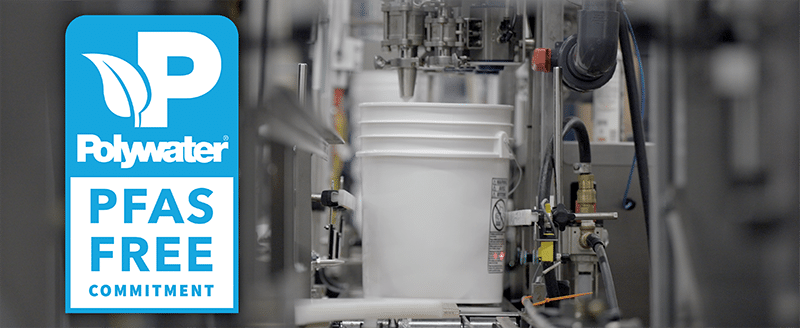Forever Chemicals in the Spotlight: A PFAS-Free Commitment from Polywater
Polywater® affirms zero use of per- and polyfluoroalkyl substances (PFAS) in its formulations, manufacturing, and packaging.

Per- and polyfluoroalkyl substances (PFAS), often referred to as “forever chemicals,” are under increasing scrutiny for their persistence in the environment and their potential risks to human health. As public concern rises and new regulations take shape, Polywater® is proud to clarify its position: PFAS have no place in our products or processes.
The Growing Concern Over PFAS
PFAS have made headlines around the world, sparking concern in communities, government agencies, and industries alike. First introduced in the 1940s, these synthetic chemicals were widely adopted for their resistance to heat, water, and grease. They’ve been used in a wide range of products including clothing, carpets, cleaners, firefighting foam, food packaging, and non-stick cookware.
What made PFAS appealing in manufacturing is exactly what makes them troubling today: their remarkable stability. These compounds do not readily break down in the environment, and their mobility means they can travel through soil, water, and even air. PFAS have been found not only near industrial areas, but in remote, unpopulated regions and in the bodies of wildlife and humans across the globe.
Health studies have linked long-term PFAS exposure to serious conditions such as cancer, thyroid disease, liver damage, high cholesterol, heart disease, and decreased fertility. As awareness of these risks continues to grow, so too does the pressure to address their use and legacy.
| White Paper: Theoretical and Practical Control of Solvent Exposure During Electrical Cleaning |
New Regulations, Global Momentum
The push for PFAS regulation has accelerated in recent years. In 2024, the U.S. Environmental Protection Agency (EPA) designated two of the most widely used PFAS compounds—PFOA and PFOS—as hazardous substances. These compounds, once common in consumer and industrial products, were phased out of commercial production in the U.S. years ago. Similar bans and restrictions exist across many countries, some dating back to the early 2000s.
In 2009 and 2019, PFOS and PFOA were respectively added to the Stockholm Convention on Persistent Organic Pollutants, a global treaty aimed at eliminating the use of harmful chemicals. Despite this, some forms of PFAS continue to be produced and used in applications that currently lack effective alternatives, such as firefighting, personal protective equipment, and certain medical devices. As scientific knowledge advances, so does the global effort to reduce or eliminate PFAS use entirely.
PFAS and Manufacturing
Even with regulatory progress, PFAS are still being used in various industries around the world, sometimes in newer forms meant to be less persistent. However, these replacements are still cause for concern due to their potential to harm both human health and the environment.
This evolving landscape has led manufacturers, chemical suppliers, and compliance departments to closely examine the materials they use—not just in final products, but throughout their facilities and supply chains. At Polywater, we receive inquiries from customers seeking assurance that PFAS are not part of our products. We welcome these questions and take them seriously.
“This is an appropriate and responsible question to be asking a manufacturer. For us, the answer is simple: no,” says Jake Jonnes, Executive Vice President at Polywater. “PFAS are not an ingredient in our products, nor do we use them in the formulation, manufacturing, or packaging of any of our offerings.”
| Related Content: The Compelling Logic of Presaturated Cleaning Wipes |
A Commitment to Safer, Smarter Solutions
The story of PFAS mirrors past lessons from substances like chlorofluorocarbons (CFCs)—once widely used, now recognized for their lasting environmental consequences. In hindsight, the question isn’t why manufacturers used them, but how industry can move forward more responsibly.
“At Polywater, it is a core objective to ensure that customers have what they need to get the job done right, safely, and with the smallest possible environmental impact,” says Gary Wellman, Plant Manager.
“While PFAS were once used throughout many industries we work alongside, they are simply not part of our business or our product portfolio,” adds Sheri Dahlke, Vice President of Research and Development. “We’re aware of the risks, and we’ve made the conscious choice not to engage with those chemicals.”
Looking Ahead
The PFAS era is not over, but it is changing. Increased regulation, heightened public awareness, and scientific insight are all driving momentum toward safer alternatives and greater accountability. Polywater is committed to staying ahead of this shift—not only by having products without PFAS ingredients, but by promoting cleaner, more sustainable solutions for the infrastructure industries we serve.